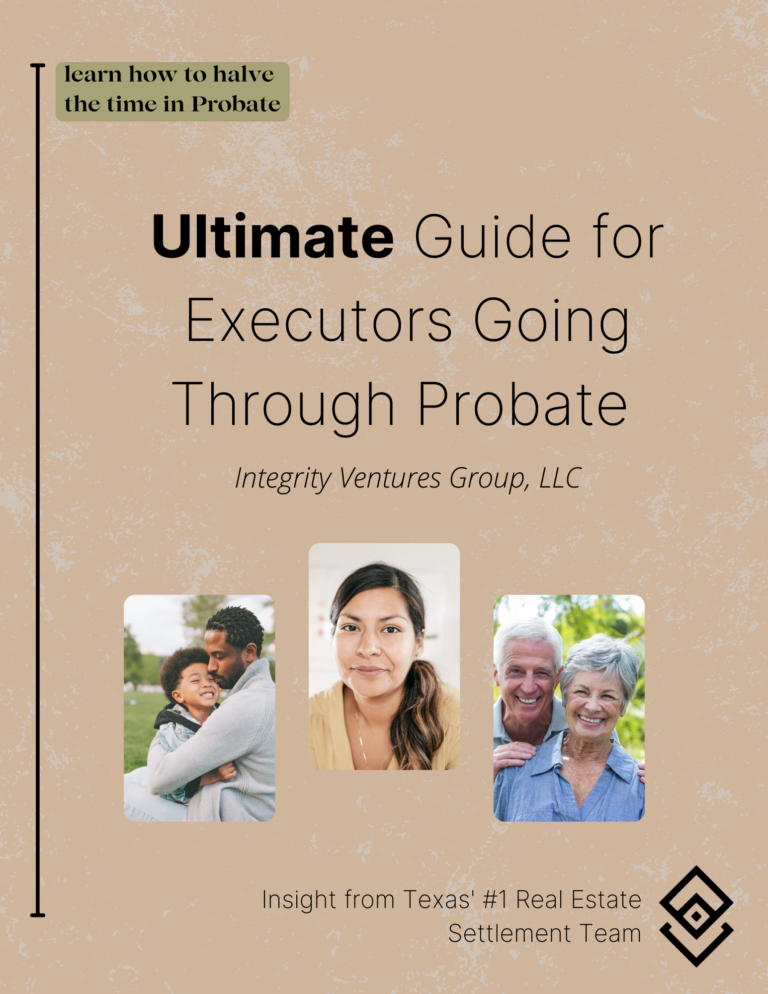do you want to cut your probate Process time in half?
Selling Real Estate While in Probate in Texas: Can You Do It?
disclaimer
Integrity Ventures Group asserts that it is not a licensed lawyer, and this article is intended solely for providing general guidance and information, and should not be considered as legal advice or a substitute for consulting with a qualified attorney. For any specific legal grievances related to personal probate cases, we strongly advise individuals to seek professional legal counsel and engage the services of a licensed attorney.
At Integrity Ventures Group, we pride ourselves on being the premier estate settlement firm in Texas. Our expertise lies in assisting families daily, helping them unravel the complexities of their probate proceedings alongside their attorneys. We would be honored to extend our knowledge to help guide you through your unique journey as well. Let’s Dive into: selling real estate while in probate in Texas.
Introduction
Probate is the legal process that takes place after someone passes away to settle their estate, including the distribution of assets like real estate. In Texas, this procedure is overseen by the probate courts and involves the execution of a will or the determination of heirs if no will exists. One common question that arises during probate is whether the estate’s real estate can be sold. The short answer is yes, but the process can be complicated and involves adhering to various state laws and court procedures. This article aims to provide an in-depth look into selling real estate during probate in Texas, discussing the legalities, the steps involved, and the roles of various parties.
Preliminary Steps: Is Probate Necessary?
The first question to ask is whether probate is even necessary. Texas law offers some alternatives to formal probate that could simplify the process of transferring assets. These alternatives include:
Small Estate Affidavits: If the estate’s value, not counting exempt property like the decedent’s homestead and some personal property, is $75,000 or less, then a small estate affidavit could be used to transfer assets without formal probate.
Muniment of Title: If there are no debts against the estate and a will exists, transferring property can be done without a formal administration through this legal mechanism.
If neither of these alternatives applies, then formal probate is necessary.
Texas Probate Process: An Overview
Application for Probate: The first step is filing an application for probate with the probate court in the county where the deceased lived.
Hearing: After a statutory waiting period, a hearing will be scheduled to validate the will and/or appoint an executor or administrator.
Notice to Creditors: The executor/administrator must then publish a notice to creditors in a local newspaper, as well as notifying known creditors directly.
Inventory, Appraisement, and List of Claims: Within 90 days, an inventory of the estate’s assets must be filed with the court.
Payment of Debts: The executor/administrator pays valid claims against the estate.
Distribution: After debts are paid, remaining assets are distributed according to the will or state law if there is no will.
Closing the Estate: The executor/administrator files a final account, and the estate is closed.
Selling Real Estate During Probate
Independent vs. Dependent Administration
The ability to sell real estate largely depends on the type of administration—either “independent” or “dependent.”
Independent Administration: This is a more streamlined process, often stipulated in the will, where the executor has the power to manage and distribute assets with minimal court intervention. This typically includes the authority to sell real estate without obtaining court approval, although the sale is usually subject to the notice and objection by the beneficiaries or creditors.
Dependent Administration: In this more restrictive form, the executor/administrator needs court approval for most actions, including selling real estate.
Steps to Sell Real Estate in a Dependent Administration
File an Application to Sell: The executor/administrator files an application to sell the real estate with the probate court.
Notice: A notice must be posted at the courthouse and sometimes published in a local newspaper.
Hearing: A court hearing is held where objections can be made.
Court Order: If approved, the court issues an order authorizing the sale.
Sale and Report: After the sale, a report must be filed with the court detailing the transaction.
Order Confirming Sale: The court reviews the sale and issues an order confirming it.

Steps to Sell Real Estate in an Independent Administration
Notice to Beneficiaries: Even though court approval is generally not needed, notice should be given to beneficiaries and any objections should be dealt with.
Sale: The executor can proceed with the sale.
Filing a Deed: A deed transferring the property to the new owner must be filed with the county recorder’s office.
Report to Court: Though not always required, some courts may ask for a report detailing the sale.
Important Considerations
Fair Market Value: The property must generally be sold at a price closely approximating its fair market value, often necessitating an appraisal.
Title Issues: Probate can clarify title issues, making it easier for the buyer to get title insurance.
Contract Clauses: Any sale contract should include a clause that the sale is subject to probate court approval, particularly in dependent administration.
Capital Gains Tax: The sale of real estate during probate could result in capital gains tax implications for the beneficiaries.
Conclusion
Selling real estate while in probate in Texas is possible but involves a complex set of legal procedures and rules. Knowing whether the estate is being administered independently or dependently is crucial, as it affects the level of court oversight and the speed of the sale. Consulting with professionals like probate lawyers and real estate agents experienced in probate sales can help navigate the labyrinth of Texas probate laws.
Disclaimer: This article is for informational purposes and does not constitute legal advice. It is always advisable to consult with a qualified attorney for any legal matters.
Sources:
- Texas Estates Code
- Texas Property Code
FIND MORE HELPFUL ARTICLES LIKE THIS ONE
DOWNLOAD YOUR PROBATE CHECKLIST TODAY.
Become a part of the numerous executors who have already benefited from our free guide. Elevate your probate process with our complimentary probate checklist, designed to guide you step by step through the process of selling your real estate property today. Download it now and streamline your journey through probate.






